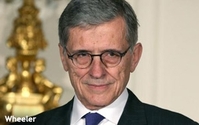FCC Reportedly Considers New Approach To Net Neutrality
- by Wendy Davis @wendyndavis, October 31, 2014
 Federal Communications Commission Chairman Tom Wheeler reportedly is considering a Net-neutrality compromise that would involve reconceptualizing broadband as two separate services, one
“back-end” and one retail.
Federal Communications Commission Chairman Tom Wheeler reportedly is considering a Net-neutrality compromise that would involve reconceptualizing broadband as two separate services, one
“back-end” and one retail.
The full details haven't been made available, but it appears from the little that's known that the back-end service would cover transmissions from “edge providers” like Netflix, while the retail portion of the service would involve data consumption by Web users. Back-end service would be subject to some common carrier rules, but those regulations wouldn't always prohibit providers from charging content companies extra fees for faster delivery, according to a new report in TheWall Street Journal.
The tentative blueprint, which appears to resemble one proposed in May by Mozilla, is seen as a way for the FCC to impose some common-carrier obligations on Internet service providers without an all-out reclassification of broadband as a utility. But some Net neutrality advocates say that the dual approach won't fully preserve open Internet principles, and also won't hold up if it's challenged in court.
The FCC's prior Net neutrality regulations were struck down by an appellate court in January on the ground that they imposed common carrier regulations on broadband providers. The D.C. Circuit Court of Appeals said in its ruling that the FCC lacked authority to issue those kinds of rules because broadband is considered an “information” service, and not a telecommunications service.
Many neutrality proponents responded to that decision by asking the FCC to reclassify broadband as a telecommunications service.
Instead, the FCC voted in May to move forward with a controversial proposal for new regulations that were weaker than the ones vacated in January. Those rules would have prohibited broadband providers from blocking sites, but allowed them into to enter into “commercially reasonable” deals to charge content companies extra fees for faster delivery.
That proposal proved hugely unpopular with consumer advocates and content companies, with many critics arguing that paid fast lanes would disadvantage start-ups, political groups and others who can't afford to pay extra tolls for speedy delivery.
Advocacy group Free Press cheered the news that the FCC seems to have backed away from the “disastrous proposal” unveiled earlier this year, but warns that the new plan won't offer “real” net neutrality protections.
“Chairman Wheeler can't wave a wand, change the law and pretend to break the Internet in two. But these schemes suggest just that: dividing the Internet to protect corporations sending information, but not the people receiving it,” Free Press President and CEO Craig Aaron stated. “Such an untested, too-clever-by-half approach is bad law and a bad idea.”
The libertarian group Tech Freedom -- which opposes reclassifying broadband as a utility -- also criticized the newest proposal. “King Solomon wasn’t serious when he proposed splitting the baby. Let’s hope Chairman Wheeler isn’t either. Subjecting any part of broadband to Title II opens the door to FCC regulation of the heart of the Internet,” TechFreedom President Berin Szoka said in a statement.



Anything other than making broadband access--all of it--subject to common carrier rules leaves Internet access open for corporate hijinks by the likes of Comcast. Chairman Wheeler knows this and is trying to leave the door open for his former masters to continue to play fast and loose with our Internet access. We must say no to this proposal and be firm in our commitment to true net neutrality.